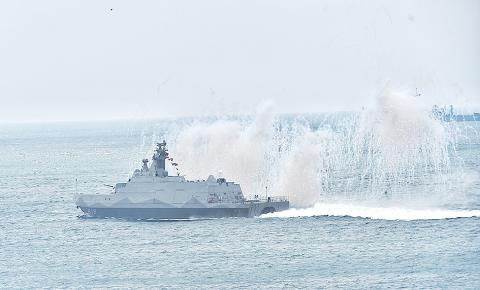Minister of National Defense Yen De-fa (嚴德發) yesterday confirmed plans to bring forward the nation’s construction of 11 Tuo Jiang-class corvettes by completing them in two instead of three phases.
Yen made the comments at a meeting of the legislature’s Foreign Affairs and Defense Committee in response to Democratic Progressive Party Legislator Lo Chih-cheng’s (羅致政) question about whether the military is making adjustments to counter the Chinese threat.
The corvette is a crucial piece of the military’s asymmetric warfare and shortening its construction schedule would increase the nation’s combat capability, Yen said.

Photo: Fang Pin-chao, Taipei Times
The ministry purchased 12 corvettes in total, with the first ship delivered in 2014, it said.
The other 11 corvettes are to come in two types: The first three anti-aircraft models are to be completed by 2025, while five anti-ship models, which were originally scheduled to be completed between 2030 and 2032, are to be brought forward to 2025, the ministry said.
The completion of the third batch, originally planned for 2039, could be moved forward as the need arises, it said.
The armaments of the third batch, whilst unknown, could include the extended range versions of the Hsiung Feng II (HF-II) anti-ship missiles and the HF-III missiles, which offer more effective deterrence against enemy vessels, the ministry said.
With a displacement of 700 tonnes, the anti-air variants are to be armed with ship-launched Tien Chien II missiles, while the anti-ship variant are to carry HF-II anti-ship missiles and HF-III supersonic anti-ship missiles, the ministry said.
The ministry has opted to contract the construction of the surface platforms via an open bid, but would commission the Chungshan Institute of Science and Technology to design and install the combat systems onboard, the ministry said.
The commission agreement and the public bid are to begin next month and should be completed by October, it said.
Navy Command Headquarters Chief of Staff of the Navy Vice Admiral Lee Tsung-hsiao (李宗孝) told lawmakers he is confident that the open bid would conclude successfully and that construction could begin next year.
Construction of the second batch will not necessarily have to wait for the completion of the first batch, Lee said, adding that it could begin as soon as next year or in 2020.
Yen also told the committee that the national defense budget would surely increase more than 2 percent for fiscal 2019.
The ministry will comply with President Tsai Ing-wen’s (蔡英文) instructions on increasing the national defense budget as a percentage of GDP by no less than 2 percent of the previous year’s budget, the ministry’s Comptroller Bureau Director Chen Kuo-sheng (陳國勝) said.

CHAOS: Iranians took to the streets playing celebratory music after reports of Khamenei’s death on Saturday, while mourners also gathered in Tehran yesterday Iranian Supreme Leader Ayatollah Ali Khamenei was killed in a major attack on Iran launched by Israel and the US, throwing the future of the Islamic republic into doubt and raising the risk of regional instability. Iranian state television and the state-run IRNA news agency announced the 86-year-old’s death early yesterday. US President Donald Trump said it gave Iranians their “greatest chance” to “take back” their country. The announcements came after a joint US and Israeli aerial bombardment that targeted Iranian military and governmental sites. Trump said the “heavy and pinpoint bombing” would continue through the week or as long

TRUST: The KMT said it respected the US’ timing and considerations, and hoped it would continue to honor its commitments to helping Taiwan bolster its defenses and deterrence US President Donald Trump is delaying a multibillion-dollar arms sale to Taiwan to ensure his visit to Beijing is successful, a New York Times report said. The weapons sales package has stalled in the US Department of State, the report said, citing US officials it did not identify. The White House has told agencies not to push forward ahead of Trump’s meeting with Chinese President Xi Jinping (習近平), it said. The two last month held a phone call to discuss trade and geopolitical flashpoints ahead of the summit. Xi raised the Taiwan issue and urged the US to handle arms sales to

State-run CPC Corp, Taiwan (CPC, 台灣中油) yesterday said that it had confirmed on Saturday night with its liquefied natural gas (LNG) and crude oil suppliers that shipments are proceeding as scheduled and that domestic supplies remain unaffected. The CPC yesterday announced the gasoline and diesel prices will rise by NT$0.2 and NT$0.4 per liter, respectively, starting Monday, citing Middle East tensions and blizzards in the eastern United States. CPC also iterated it has been reducing the proportion of crude oil imports from the Middle East and diversifying its supply sources in the past few years in response to geopolitical risks, expanding

Pro-democracy media tycoon Jimmy Lai’s (黎智英) fraud conviction and prison sentence were yesterday overturned by a Hong Kong court, in a surprise legal decision that comes soon after Lai was jailed for 20 years on a separate national security charge. Judges Jeremy Poon (潘兆初), Anthea Pang (彭寶琴) and Derek Pang (彭偉昌) said in the judgement that they allowed the appeal from Lai, and another defendant in the case, to proceed, as a lower court judge had “erred.” “The Court of Appeal gave them leave to appeal against their conviction, allowed their appeals, quashed the convictions and set aside the sentences,” the judges